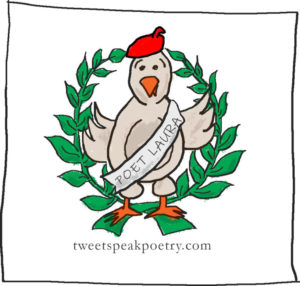A haiku in the face of danger
Me: I think something’s wrong.
My husband: We’re fine.
Me: Don’t you feel it?
My husband: We’re fine.
Me: Seriously, the boat’s tipping.
My husband: We’re . . . hmm.
As I watched the mast of our rented sailboat descend toward the water, I quickly instructed our wide-eyed boys, ages 8 and 9 at the time, to scramble to the side of the boat (now the top of the boat) and to perch there.
I remember how calm my voice sounded (We’re fine, boys—we’ve got life jackets—we know how to swim) compared to the shrieks inside my head (Oh my God—we’re sinking—we’re still sinking!).
Twenty-four hours after our ill-destined voyage, the kids solemnly approached us in the living room with a tiny purple notebook with a cartoon reindeer on the front, open to a page with a penciled poem—a (somewhat hyperbolic) haiku.
Sideways on a boat,
We were very close to death.
It was all Dad’s fault.
[By way of reassurance, we were (1) at a local lake, (2) rescued shortly by a watchful rental manager, and (3) at no time even remotely close to death.]
As you might suspect, the boys’ objective was (mostly) to poke fun at their dad, who is now a champion sailor, but who at that point in time may have been premature in taking the family out on a less-than-perfect watercraft. We had a hearty all’s-well-that-ends-well laugh, and the story (and the poem) became family lore of the comedic kind.
I also remember feeling such pride that day. After a disturbing incident, my math-and-science kids had chosen to express their alarm (and, let’s face it, reproach) using poetry—and one of its loveliest forms, the haiku.
***
At the beginning of a middle school poetry unit, my teacher wrote William Wordsworth’s well-known definition across the chalkboard in loopy cursive: Poetry is the spontaneous overflow of powerful feelings.
Ah, yes. As a child who wrote a lot of poetry, that definition made sense to me. Like many people (and most poets) I know, I didn’t relish middle school and its Lord of the Flies senselessness and cruelty. Poetry was a perfect place to pour my pre-adolescent angst and anguish, a fitting venue for the feelings that erupted and overwhelmed me hourly.
Only as a college English literature major did I read Wordsworth’s Preface to Lyrical Ballads and discover the second part of his oft-quoted aphorism, which my teacher had apparently trimmed down for my middle school brain: Poetry is the spontaneous overflow of powerful feelings that takes its origin from emotion, recollected in tranquillity [sic].
For Wordsworth, writing poetry was not just spilling feelings onto a page whenever they occurred, all at once. In fact, he deliberately defined two phases when writing poetry. The first is to feel one’s experience of life. The second is to access those emotions, consider and reflect upon them, and let them “spontaneous[ly] overflow” into poetry of substance.
This probably explains the mediocrity of my middle school poems, which were long on feeling, but short on rumination—in retrospect, I never really entered phase two. However, I certainly experienced phase one. I remember feeling a great deal of hurt and pain during those years, but also wild joy and unbridled excitement and pure pleasure. I felt freely, without holding back, without resisting. My heart was open.
And then it closed. Not all at once, but slowly and steadily, day by day.
As I grew older, the messages I received from the world told me that my messy feelings—anger, indignation, outrage—had no place, and neither did my quiet ones—adoration, admiration, whimsy. Over time, I became adept at tamping down my emotions or ignoring them altogether.
But poets know this is not the way to exist. In early adulthood, I came across “The Guest House,” in which Rumi illustrated with a host/visitor metaphor how all emotions should be received with gladness and grace:
Welcome and entertain them all!
Even if they’re a crowd of sorrows,
who violently sweep your house
empty of its furniture,
still treat each guest honorably.
He may be clearing you out
for some new delight.
The dark thought, the shame, the malice,
meet them at the door laughing
and invite them in.
Rumi’s poem tells us that, by denying what we feel, we also shut out what brings beauty and breadth to our lives. I knew I needed to “invite” my feelings back in.
It strikes me that Rumi’s lesson, coupled with Wordsworth’s formula for poetry, serve as a prescription not only for writing, but for living: feeling our full range of emotions, then reflecting upon them to understand the world around us and to understand ourselves. Here, where mind and heart converge, we find wisdom, compassion, and meaning.
In a world that often venerates the mind while derogating the heart, this is a warrior’s path.
***
When I was eleven years old, a family friend presented me with a packet of square origami paper in an assortment of colors and textures and patterns—so thin, but able to withstand intricate folding. But the elaborate instructions confounded me, and I completed only the simplest object (a sailboat, ironically enough) before giving up.
But I immediately repurposed the paper as a venue for my poems, marveling at how it displayed my (admittedly not great) words to their maximum effect, as though it was part of the poetic presentation. And it never tore, never bled ink, despite its delicacy.
The haiku form reminds me of that paper—subtle and diaphanous, but able to sustain provocative and powerful words and concepts. Originating in 13th century Japan, the haiku usually follows a syllable mandate (5-7-5 is most well known), focuses on a brief moment in time, and conveys a moment of enlightenment.
Whatever the merit of the boys’ sailboat haiku, it certainly followed those requirements. With an accurate syllable count, it isolated a frightening moment, and then provided a humorous flash of enlightenment in the form of a teasing reproach. Indeed, I think I remember the incident because of the haiku, not vice versa.

Usually, I recollect that day with laughter and humor, but concentrating and reentering the experience immediately reminded me of my terrible fright. While the boat sank, my ability to swim and my life-jacketed body couldn’t counteract a remembered childhood ordeal—gulping down chlorinated water at a local swimming pool and thrashing wildly for breath while the instructor scolded, This is how you learn.
As I continued to reflect on my emotions as the boat tipped and sank, I perceived something else—something apart from my terror and my rising panic. It was my cognizance of the kids next to me. It was my comprehension that my behavior would influence theirs—that my reaction would make this incident either a merely disturbing one, or a traumatic one. The boat had no anchor, but I anchored these children.
As we sink to dark,
I find my courage, children,
so you can find yours.
I marveled at that knowingness, that mother-magic, which came from as deep and as buried a place as my fear, but which spurred me to transcend it. In my own flash of realization, it became clear: we are always “very close to death”—continuously, painfully, unpredictably so. How devotedly and courageously we show up for one another, is all that matters.
With that in mind, I wanted to send the kids a message, a loving directive, into the past:
Sideways on a boat,
feel each feeling that rises,
for I’ll bring you home.
Your Turn: Poetry Prompt
Is there a moment from your past you can engage with in the spirit of Wordsworth’s “spontaneous overflow of powerful feelings”? Write a haiku as a means of reflection.
Featured photo by Mish Sukharev, Creative Commons license via Flickr. Post by Dheepa Maturi.
- Morphing: Lessons from the Year of the Monarch - October 23, 2024
- Year of the Monarch: Butterfly Kisses—A Romantic Comedy - August 7, 2024
- Year of the Monarch: In Sync — a Communal Poem for the Monarch Butterfly - April 11, 2024

L.L. Barkat says
Your boys’ haiku made me laugh. How fun!
And this? Spoke to my maternal heart, deeply:
As we sink to dark,
I find my courage, children,
so you can find yours.
Thanks for this thoughtful explication of poetry’s ways, Dheepa.
Lori Welge Fulk says
Not a Haiku, but a thank you, because Winnie has died, and now Rufus is dying. With the loss of the girls’ pets, unexpectedly, I FEEL your poem. Thank you.
Kaki Garard says
I always took motherly pride in my moments of displaying calm when all the scared children’s eye rested on me. Why was I the chosen steady force? I’m not sure… but I Hereford especially love:
“ As we sink to dark,
I find my courage, children,
so you can find yours.”
Your efforts are so appreciated, Dheepa – TY!
Karen Paul Holmes says
Love it, Dheepa. The boys’ haiku is perfect! And I so relate to this marveling,: “I marveled at that knowingness, that mother-magic, which came from as deep and as buried a place as my fear, but which spurred me to transcend it.”
Thank you!